Greetings, book and treat people! I’m writing this from my porch, in the early morning mist, on a day that’s forecast to be 89 degrees (there are no words for the depths of my hatred, summer can go to hell). But right now I’m in a sweatshirt, the trumpet vine on my porch railing is putting out new leaves every day, and in the last 20 minutes I’ve seen rose-breasted grossbeaks, hairy woodpeckers, red-winged blackbirds, dark-eyed juncos, and pine siskins around my feeder. I finally planted my herb pots. Later today I’ll go to the lake. I hate summer, but I love many things that happen in summer.
Thank you, thank you, thank you to everyone who’s subscribed over the last week. I don’t have any big words or little stories about that today. I am endlessly grateful that many of you have chosen to pay for this work so that I can continue making it accessible for everyone. I hope, if you haven’t done so yet, you will—maybe right now! As a reminder, if I haven’t met my goal by June 12th, I’ll be paywalling the newsletter. You can also pledge to subscribe instead: it takes 30 seconds and I’ll count your pledge toward my financial goal.
And because you’re probably here because you love books, I’m running a fun giveaway through the end of May: I’ll be giving away two $30 gift cards to Bookshop.org! All you have to do is subscribe (or pledge your support) by May 31st, and you’ll be automatically entered. If you’ve already subscribed this month, consider yourself entered (unless you don’t want to be, in which case, let me know). I’ll randomly select two winners on June 1st.
I realized last week that I never sent an end-of-month reading reflections newsletter for April! Now it is May 22nd, but I’m sending it out anyway, because a) I do what I want and b) I love writing these monthly reflections. April was a wildly unusual reading month for me. I gave myself up to poetry school. Here’s a little bit of what it felt like.
April began in brown and grey: two of my favorite early spring hues. I hardly read any novels at all. I read more nonfiction than fiction. I read eleven poetry collections and seven books by poets and/or about writing and making art. It felt weird, but good.
I started the month with two final reads for the Trans Rights Readathon: Gender Outlaw by Kate Bornstein and She of the Mountains by Vivek Shraya. What a beautiful pairing! I loved Bornstein’s humor, brashness, joy, and delight in tearing apart binaries. Books by queer elders are always a balm. And you might know by now how I feel about books by Shraya—always a yes. She of the Mountains is my favorite kind of genre-exploding novel.
Almost all my April mornings began with a poetry school ritual: reading, writing, and being present. I copied down poems I love and wrote about why I love them. I wrote a poem every day. I tried many delicious new forms: villanelles, ghazals, tankas, golden shovels.
The first collection I finished was The Amputee's Guide to Sex by Jillian Weise. It’s a sharp and searing collection about disability and desire and womanhood. The poems are tight and constrained. They have a sharp, formal rhythm that makes their fury burn bright.
On April 4th, it snowed. After a nearly-snowless, disappointing winter, this storm was a gift beyond words.
I listened to Wild and Precious: A Celebration of Mary Oliver, while walking through the colors of the month: the pale gold, the new green, the silver mists. I listened to it while driving around my little town doing errands. I cried in so many parking lots and on so many stretches of road. I love this book profoundly.
I let Mary guide me through the rest of the month. She is not the poet I thought she was. She is a port of refusal. She is a love poet, a domestic poet, a poet among. She is teaching me how to come in. She is reminding me that, as Ross Gay said in Wild and Precious, “we are profoundly made of one another.”
In A Poetry Handbook, she’s prickly and stubborn. She waves around her opinions like they are unassailable fact. I didn’t agree with everything she said, and I loved getting to disagree with her, to think with her—nodding along one moment, shaking my head the next. But my favorite moment in this whole book: when she roasts Whitman by describing ‘O Captain! My Captain!’ as “a fairly miserable poem.” I could not stop laughing. I’m still laughing about it.
Our World is a gorgeous book about Mary Oliver’s life with her partner, Molly Malone Cook. It was published four years after Cook’s death, and it contains her photographs alongside Mary Oliver’s writing. I read it as slowly as I could. It is a precious, living thing. I don’t even know what to say about it. I held my breath, turning the pages. At times it felt like too much—a gift too private and tender to behold.
I don't think I was wrong to be in the world I was in, it was my salvation from my own darkness. Nor have I ever abandoned it those earthly signs that so surely lead toward epiphanies. And yet, and yet, she wanted me to enter more fully into the human world also, and to embrace it, as I believe I have. And what a gift to read about her wish for it, who never expressed impatience with my reports of the natural world, the blue and green happiness I found there. Our love was so tight.”
Everything about my reading in April felt strange: stretched, new, green. I didn’t reach for the kinds of books I used to want to read. I reached for new and stickier texts, slower texts, books that touched me differently, woke up different organs.
I spent a whole week inhaling poetry collections: Whale Aria by Rajiv Mohabir is a dense and beautiful book about language and inhabiting language and bodies and inhabiting bodies. It’s full of whale songs! “I want // to taste any / body that shines / in the dark.”
Field Folly Snow by Cecily Parks: a sparse, cutting book about the American Western landscape, and landscape more broadly. Many of the poems are about fields, snow, horses, fences, cottonwoods, rivers, fish. There is something both mountainous and pastoral in them. They are almost all grounded in concrete images of western landscapes—but those landscapes leap and twist to include the interior, the strange.
Vantage by Taneum Bambrick is both lovely and upsetting. It’s about the time the author spent collecting trash along dams on the Columbia River in rural eastern Washington. The poems are full of bodies. “We can only save the river with our memory of what the river means.”
My daffodils sprouted and budded.
Mary Oliver’s A Poetry Handbook was not the only poetry school “textbook” I read in April. Singing School by Robert Pinsky is a personal anthology of poems he loves. He argues that the best way to learn how to be a poet is to copy down the poems you love. He writes about the importance of not only looking at them closely, but letting them move through your fingers. Yes! It’s a joyful, illuminating practice! I did find 95% of the poems in this anthology super boring, though (soooo many white men).
Another brilliant collection: Arrow by Sumita Chakraborty. It’s about grief and the worlds grief builds, mythology and weather, amazement and space. There are several long poems that are just stunning, thick and deep and oceanic. “Every planet roils / with the gravity made by some ordinary evil.” And also: “If it is the last thing I do, I'll command you to be amazed.”
I had the pleasure of listening to Hanif Abdurraqib and Ross Gay speak earnestly and abundantly about Abdurraqib’s new book (my heart). At one point Abdurraqib said, “a commitment to love is widening your grace points,” and Ross Gay said, “there are a million parts to a second…so let’s participate in our own becoming.”
For years, I’ve been reading with fast maximalist ferocity: a joyful devouring. I don’t regret a moment of it, but I don’t want to read that way anymore. Abdurraqib talked about how he’s recently “aged into a desire for close attention.” He’s only two years older than me, and I felt those words all over my skin. I feel like I’m aging into being a poet. I’m aging into slowing down, into a new kind of flux—aging, maybe, into the earnestness I carried so effortlessly as a child. This is what poetry school in April felt like: aging into the wild openness of being a beginner.
I read My Trade is Mystery by Carl Phillips and it opened me in about ten thousand ways. He writes so clearly and with so much curiosity and delight about poem-making, mystery, fallowness, creative ambition, revision, audience, identity, getting lost, silence. A hundred stars.
The queer self that I couldn't yet acknowledge, let alone love, was my first audience. I sang myself through, or more exactly, one of my selves sang another one through. Those songs became my first book.
In mid-April, I started a slow read of Nomenclature: New and Collected Poems by Dionne Brand. Every weekend, I take myself on a date to the Upper Bend (shoutout to their amazing house-made sodas) to read it. I spend an hour or so reading, thinking, and taking notes. It took me three weeks to get through Christina Sharpe’s incredible introduction. Now I’m halfway through the first 70-page poem. I had to make a library wishlist to keep track of all the supplemental texts I’m reading/want to read for this independent study, which I’ve just named ‘World-Building, Refusal, & Portals: The Poetics of Dionne Brand’. I’m taking it as seriously as a yearlong graduate seminar. It’s maybe my favorite thing that has ever happened in my reading life. My current supplemental texts include Color by Countee Cullen and She Tries Her Tongue, Her Silence Softly Breaks by M. NourbeSe Philip.
More amazing poetry: Coriolis by A. D. Lauren-Abunassar! I felt this book in my bones, the words sitting on my skin. These poems are about grief and displacement, sexual violence and its aftermath, Arab womanhood, invisible Arab womanhood. They are about water and what water holds. They are about the loss of self and the struggle to document that, about endless cycles of becoming and unbecoming. What does a body become when it dies? What does a word become when it’s spoken?
My daffodils bloomed. I wrote approximately seven poems about daffodils, but I don’t think I’m done yet.
I read Thrown in the Throat by Benjamin Garcia. A delicious collection, full of language joy. There is so much music and so much gorgeous rhyme. A feast for the tongue.
I visited a new bookshop for Independent Bookstore Day, Unnamable Books in Turners Falls. Their poetry section (used and new) is incredible! I may or may not have declared stopping by to buy one (1) book part of my weekly date with Dionne Brand.
More poetry! I loved From Unincorporated Territory [Åmot] by Craig Santos Perez. Åmot means medicine in Chamoru, and this book is full of medicine—and the violence it seeks to heal. Perez’s poetics is a physical poetics, a poetics of movement and rupture. Over and over again, beautiful songs about ancestral knowledge and thriving native ecosystems are violently interrupted by bald, stark facts about colonization and its continued aftereffects. The interruptions require the reader to move in and out of the physical space of the poem.
I read The Cowherd's Son by Rajiv Mohabir too quickly, but I enjoyed it a lot. It’s a collection that does a lot of traveling, through and across—across distances, across language, across time.
Nessa and I snuggled.
I read three novels near the end of the month: Hombrecito by Santiago Jose Sanchez, How We Named the Stars by Andrés N. Ordorica, and Ædnan by Linnea Axelsson. I enjoyed them all. But I feel weirdly disconnected from novels right now. I’m straining against narrative. I’m looking for a different way to story.
I reread I Hope We Choose Love by Kai Cheng Thom while college students across the world set up beautiful Gaza solidarity encampments and people’s universities. I read it thinking about revolution and conflict. I read it while disagreeing with people I respect on the internet. It’s centered on queer and trans activist communities, but I think it’s a book we all need right now. We cannot get free if we don’t make space for loads of imperfection, loads of growth. I know this, and still I feel the desire to simplify and draw hard lines arising in myself. Still, I have to fight it. Certain truths are non-negotiable, absolute, but the hows and whys, the tactics and strategies of liberation—are not. There are infinite ways. Everything we build is porous. We must be like water. That’s what Thom says in this short but urgent work: let’s love each other like water, which catches the light as it moves.
I read The Moon That Turns You Back by Hala Alyan and it broke me open, the way spring sunlight and spring leaves can break you open, make new space inside your chest.
I finished the month on audio the way I began it, with humor and wisdom from a trans elder. I Heard Her Call My Name by Lucy Sante is full of playfulness. It’s about her decision to come out as trans in her 60s, and all the complex reasons she didn’t come out earlier in her life. It’s political and personal. She weaves the systemic into the intimate. She refuses to be good, neat, palatable.
At the end of the month, I met up with a bookstagram friend to hear Ada Limón speak at Smith. She spoke about how all poetry deals with the failure of language, and that is part of why poets (and humans) return to it again and again. I cannot stop thinking about this. I cannot stop thinking about how poetry is one of the oldest forms of human art. It has always been here. Since the beginning of language. And maybe this is why, because wherever we’re trying to get with poetry, we’re never going to get there. The power and the magic is in the attempt.
I am reading and writing into the failure of language. I am reading and writing to become a port of refusal, a port of entry, a portal. I am reading somewhere new.
Catch you next week, bookish friends!

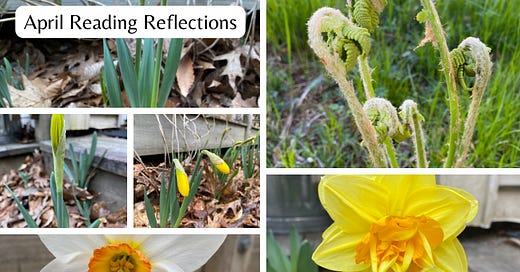




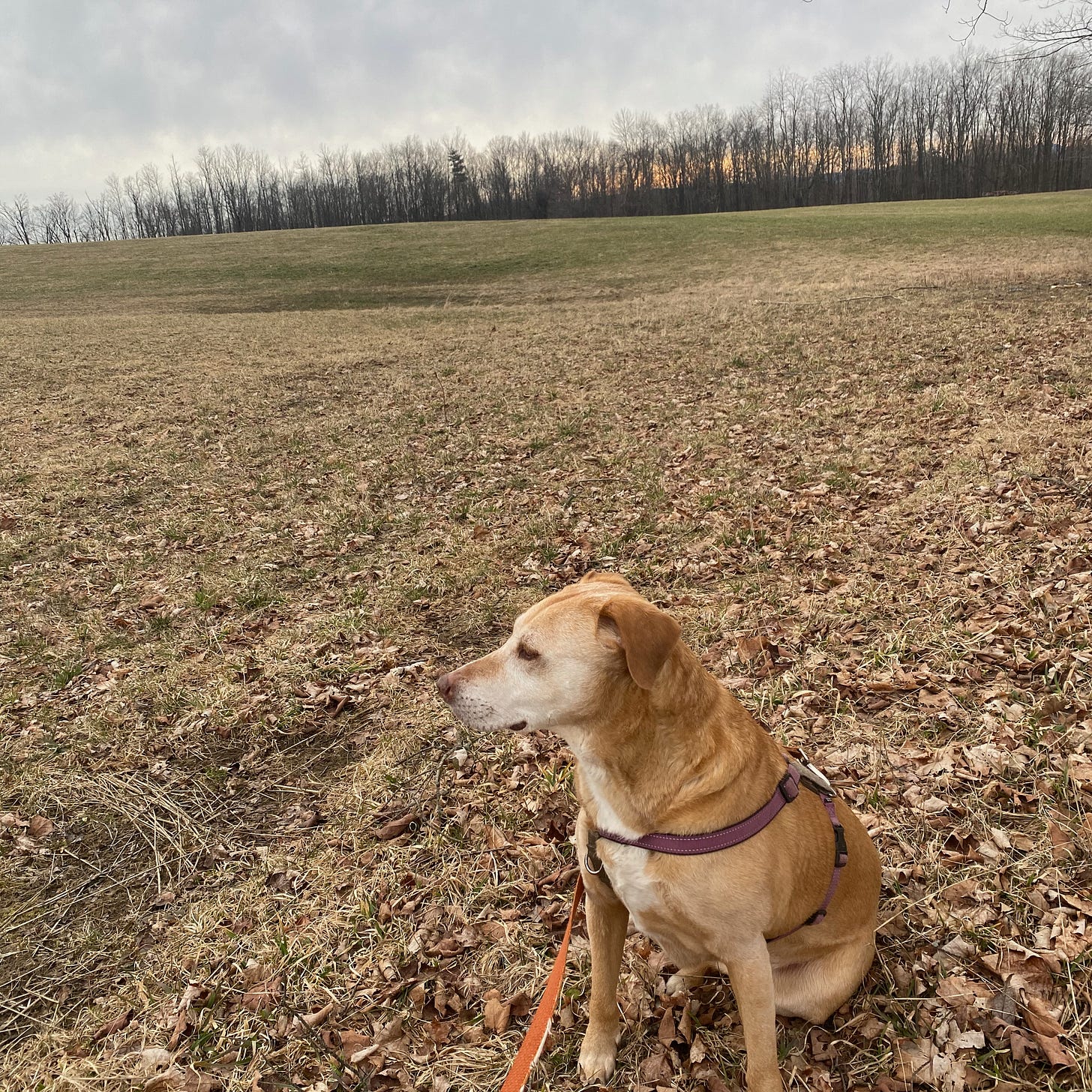
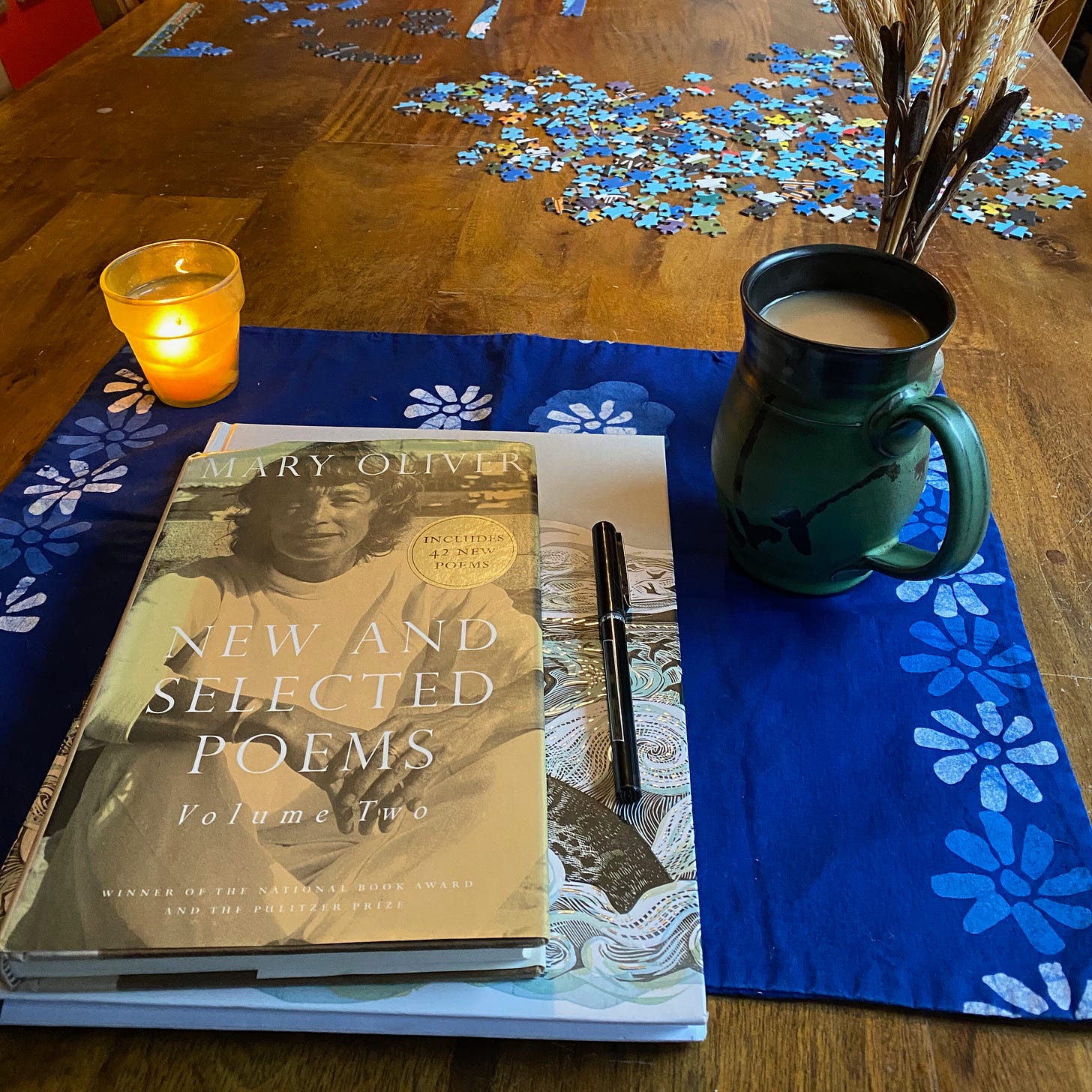
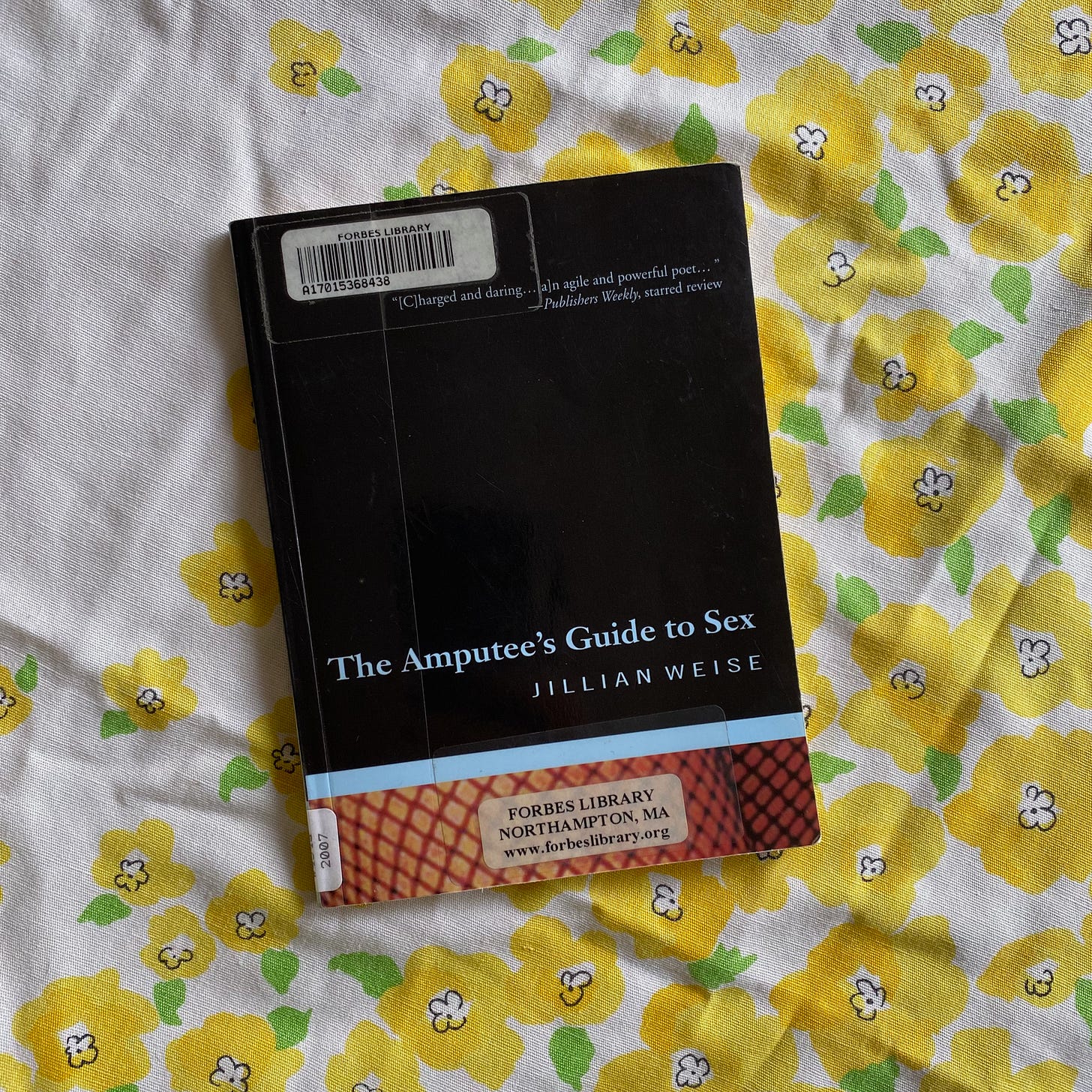




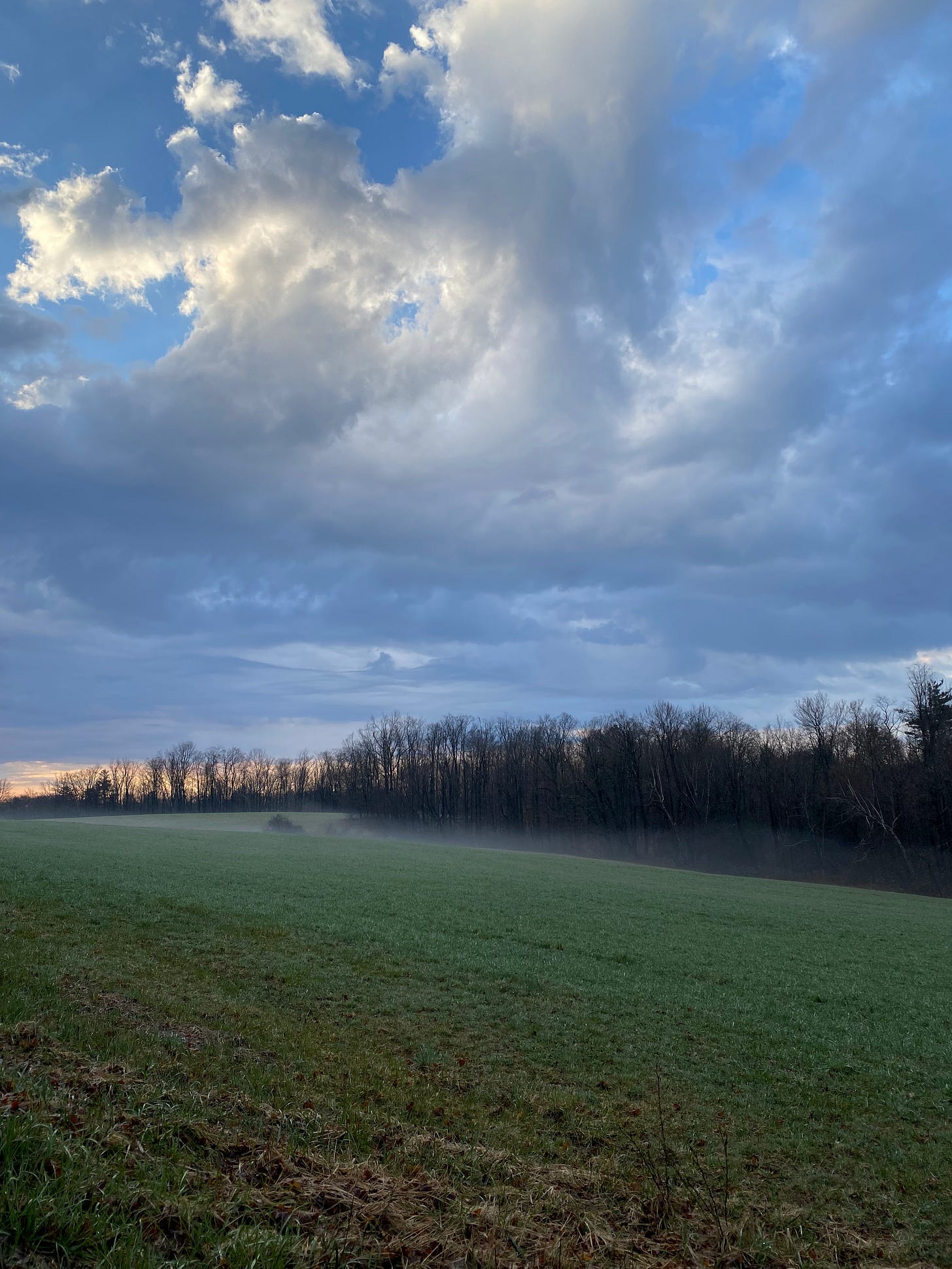











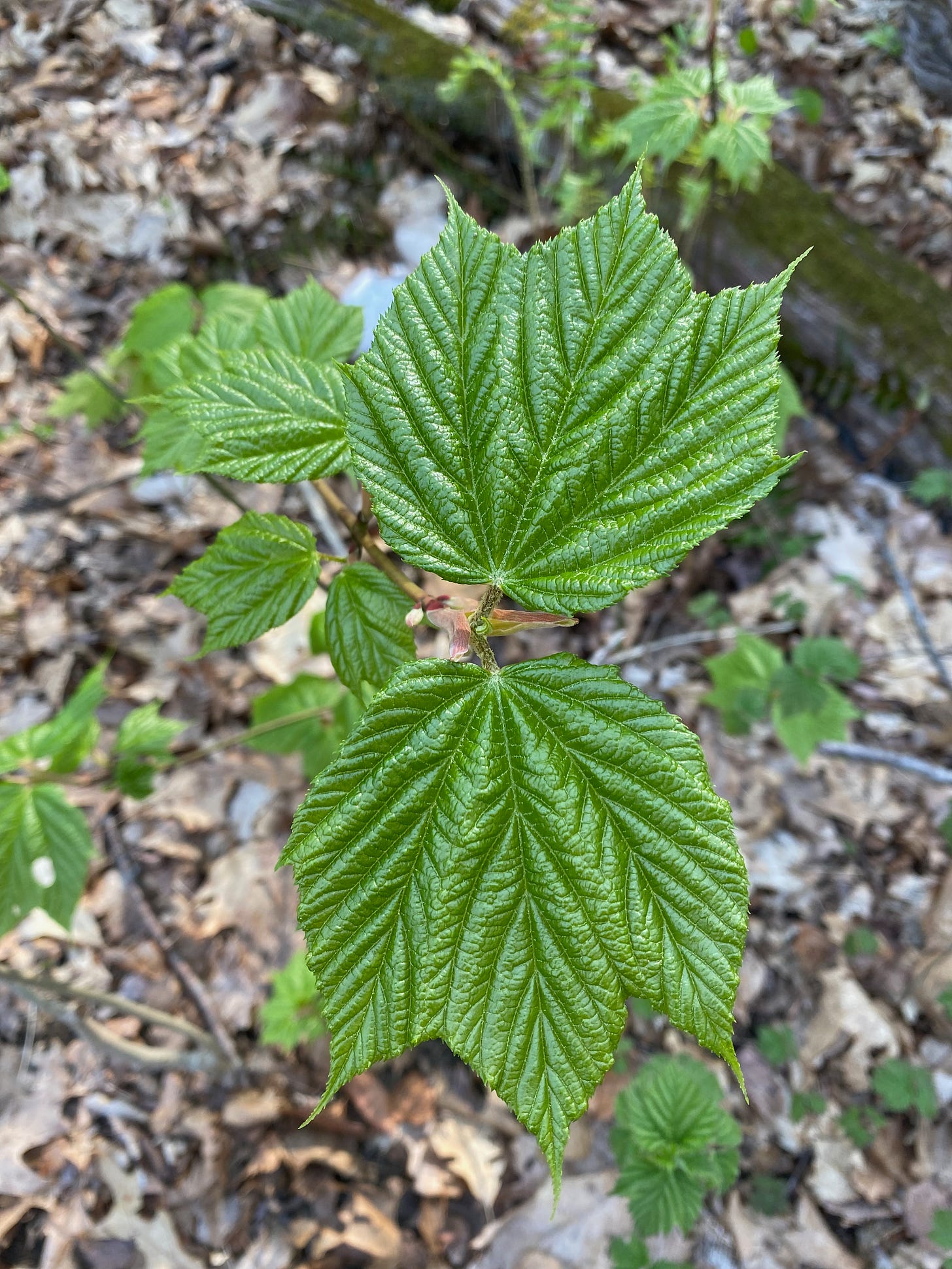
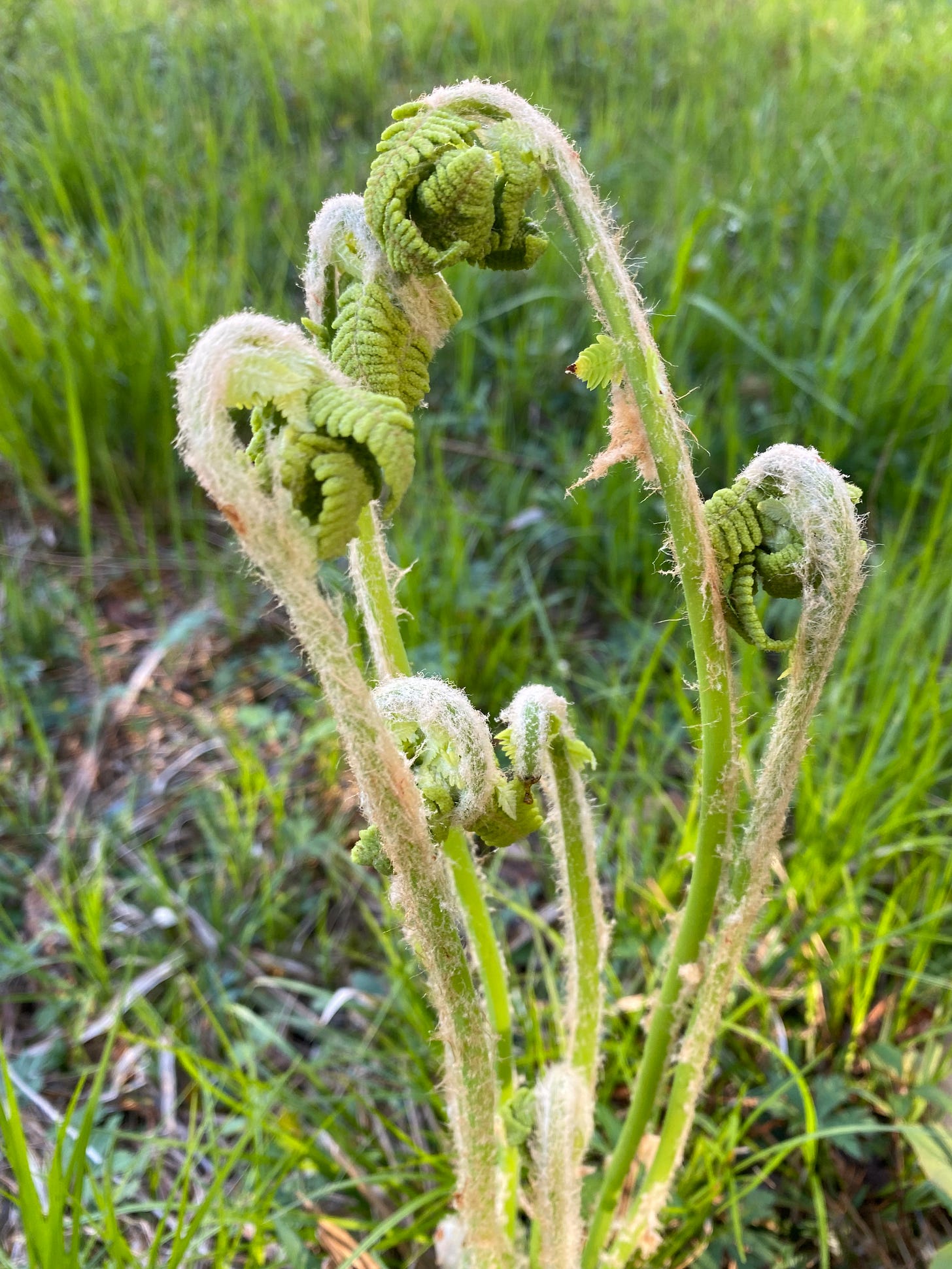
Hell yeah you do what you want!! Love this delayed April reading reflections! I’m also feeling a bit out of sync with reading novels right now - I wonder what’s in the air? Both Aednan and Homebrecito are new introductions to me and they both sound wonderful so thank you for the recs 💙 and I think never ending poems about daffodils is incredibly valid - as one of the first flowers to bloom in the year they are a real joy.
Mary is sooo grumpy and prickly in A Poetry Handbook!! Grumpy Mary is my all-time favorite. And Our World?? Thank you for holding it so dearly. I don't even know how to talk about it. Gah. Love to you and Nessa always!